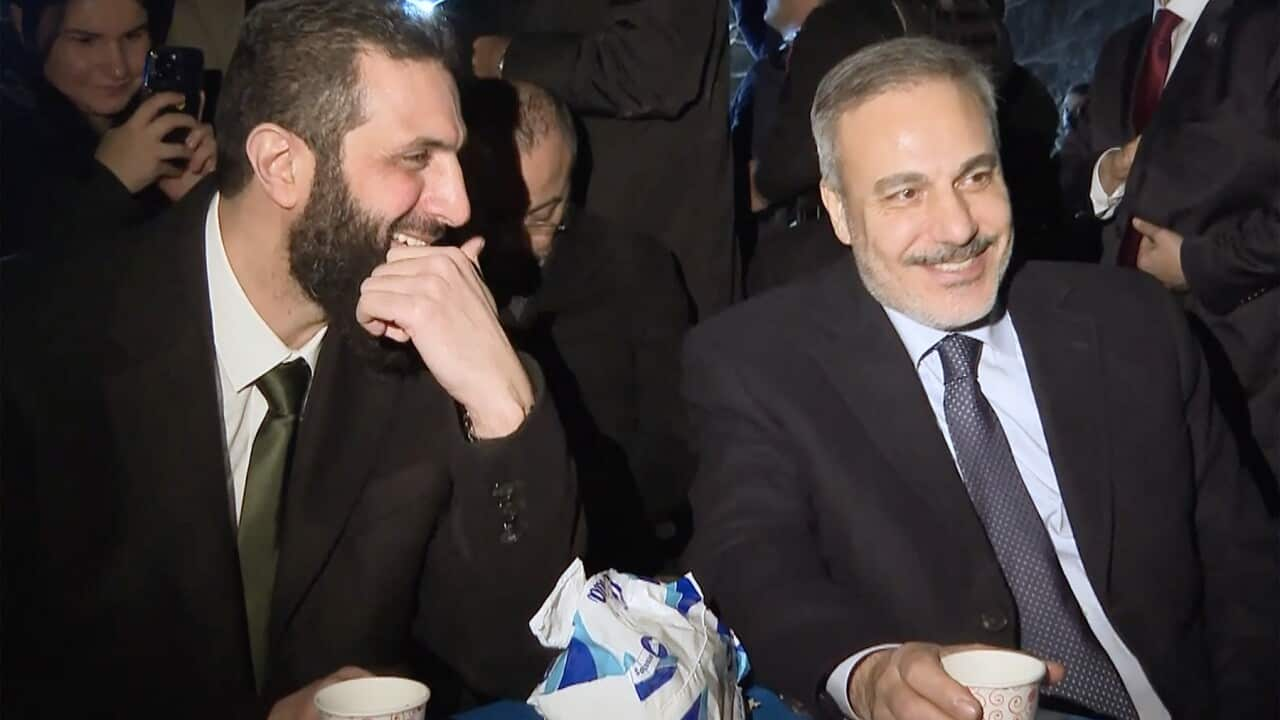TRANSCRIPT
Ahmed al-Sharaa, rebel chief and current de facto leader of Syria, led a group of militias to a swift, surprise victory over President Bashar al-Assad's forces after a prolonged 13-year civil war.
And now the military leader is seeing advances on a new front, that of diplomacy and public relations.
Mr al-Sharaa who has now dropped his wartime nickname of Abu Mohammed al-Golani - leads the Islamist Hayat Tahrir al-Sham group which was the largest group in the anti-Assad rebel coalition.
The former Al-Qaeda ally has now attempted to position himself as a champion of all Syrians, not just Sunni Muslims, and says he will shepherd in a transitional government before democratic elections can be held.
But the first obstacle on his agenda has been swaying Western governments who previously viewed his group as a terrorist organisation while calling for all international sanctions on Syria to be lifted.
"We must deal with the Syrian issue in line with current events. These current events require the lifting of all sanctions because these sanctions were placed on Syria due to the regime that was ruling Syria and had committed all these crimes. So it makes no sense to convict the torturer and the victim at the same time. Today, thank God, the weak have gained victory over this regime and kicked out this regime from the scene. These sanctions must be lifted, then we will be able to implement our programmes for growth and reform in the country."
On Friday, the United States government announced it would be dropping a 10 million U-S dollar bounty for the arrest of Mr al-Sharaa following diplomatic talks.
Assistant Secretary of State Barbara Leaf says the discussions were very productive, saying the leader came across as pragmatic.
This was just one example of a whirlwind diplomatic tour from Mr al-Sharaa, who has dropped his former military fatigues in favour of a politician's suit.
And now, after another meeting with Türkiye's foreign minister Hakan Fidan, Mr Fidan has also called for global sanctions to be lifted as soon as possible.
"Lifting sanctions against Syria is of the utmost importance for the normalisation of Syria and for security to be established in the country. The necessary preparations needs to begin immediately regarding rebuilding Syria. The creation of the environment that will allow for our Syrian brothers to return home voluntarily and safely will only be possible in this way. In this regard, the international community needs to provide strong support for the new administration. I hope our visit today will encourage high-level contact from other countries as well."
Mr Fidan has signalled Türkiye is willing to support Syria in rebuilding the country, but have demanded Kurdish rebel groups be disbanded or disarmed.
In response, the HTS leader vowed during the meeting to bring all weapons in the country under state control.
“We will not by any means allow for arms outside the control of the state, whether from revolutionary factions or factions in SDF areas. We need to close this chapter as quickly as possible because the presence of rogue arms in the country is what leads to chaos and unstable security. So this is one of the priorities and on the agenda. It is the top of our priorities to work on controlling arms in the country and I think there is wide agreement among the factions. God willing, things will work out well.”
But it's not just the international community that Ahmed al-Sharaa has to convince.
The rise of HTS following Assad's fall has been troubling for minority groups such as Shia Muslims, Christians, Kurds and the Druze community who have often been targeted by similar Sunni Islamist groups.
Some have worried H-T-S may impose strict and discriminatory Islamic governance on the country.
In an attempt to allay these concerns Mr al-Sharaa has held another recent meeting with Lebanese Druze leader Walid Jumblatt promising that the post-Assad Syria will not have sectarian divisions.
Mr Jumblatt says he was pleased by the gesture and is confident in the future.
“We come to congratulate the whole Syrian people from east to west. We came and you listened and now the page of hope of freedom will rise on all Syrian people and also through it to Lebanon.”
Meanwhile in Damascus, the end of the oppressive Assad regime has left deep wounds that have only begun to heal.
Families are still searching for missing loved ones, many of whom had been jailed or abducted years earlier.
Posters showing pictures of missing people are plastered all over a wall in the centre of the city as the search continues.
Neama al-Hussein is walking around the streets asking bystanders if they had seen her brother.
She says he was an imprisoned army defector and has now left Sednaya prison but is yet to be found.
"Someone saw him leaving the prison and we saw him on videos but today we can’t find him because he has lost his mind. He was once a teacher, educated, and was not lacking anything. We hope that whoever has seen him will tell us where he saw him or anything he knows about him. We pray to Almighty God for relief for everyone who is suffering, and may everyone return to their families, God willing.”













